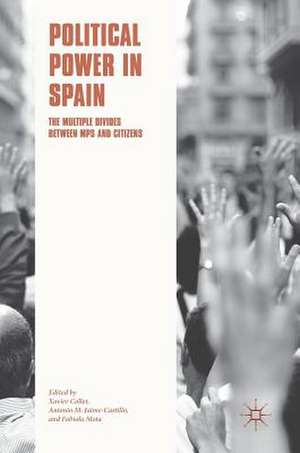Political Power in Spain: The Multiple Divides between MPs and Citizens
Editat de Xavier Coller, Antonio M. Jaime-Castillo, Fabiola Motaen Limba Engleză Hardback – 13 dec 2017
| Toate formatele și edițiile | Preț | Express |
|---|---|---|
| Paperback (1) | 583.93 lei 6-8 săpt. | |
| Springer International Publishing – 23 iun 2018 | 583.93 lei 6-8 săpt. | |
| Hardback (1) | 731.91 lei 6-8 săpt. | |
| Springer International Publishing – 13 dec 2017 | 731.91 lei 6-8 săpt. |
Preț: 731.91 lei
Preț vechi: 892.57 lei
-18% Nou
Puncte Express: 1098
Preț estimativ în valută:
140.05€ • 146.62$ • 115.88£
140.05€ • 146.62$ • 115.88£
Carte tipărită la comandă
Livrare economică 05-19 aprilie
Preluare comenzi: 021 569.72.76
Specificații
ISBN-13: 9783319638256
ISBN-10: 3319638254
Pagini: 324
Ilustrații: XIX, 327 p. 11 illus., 2 illus. in color.
Dimensiuni: 148 x 210 mm
Greutate: 0.57 kg
Ediția:1st ed. 2018
Editura: Springer International Publishing
Colecția Palgrave Macmillan
Locul publicării:Cham, Switzerland
ISBN-10: 3319638254
Pagini: 324
Ilustrații: XIX, 327 p. 11 illus., 2 illus. in color.
Dimensiuni: 148 x 210 mm
Greutate: 0.57 kg
Ediția:1st ed. 2018
Editura: Springer International Publishing
Colecția Palgrave Macmillan
Locul publicării:Cham, Switzerland
Cuprins
Chapter 1. The need for the study of parliamentarians in Spain; Xavier Coller, Antonio M. Jaime-Castillo and Fabiola Mota.- Chapter 2. The composition of Spanish parliaments: what are the MPs like?; Inmaculada Serrano and Sandra Bermúdez.- Chapter 3. Gender and parliament: the impact of the political presence of women; Tània Verge, Amparo Novo, Isabel Diz and Marta Lois.- Chapter 4. Political socialization and motivation; Carol Galais.- Chapter 5. Recruitment and selection; Xavier Coller, Guillermo Cordero, José M. Echavarren .- Chapter 6. Professionalization and parliamentary careers; Robert Liñeira, Jordi Muñoz.- Chapter 7. Parliamentary groups and institutional context; Antonio M. Jaime-Castillo, Gloria Martínez-Cousinou.- Chapter 8. Parliamentary political representation; Fabiola Mota Consejero.- Chapter 9. Political Disaffection; Antonio M. Jaime-Castillo, Edurne Bartolomé, Gloria Martínez-Cousinou.-Chapter 10. National and regional identity; Xavier Coller, Guillermo Cordero, José M. Echavarren.- Chapter 11. National Identity and Political Representation: Rival ‘Top-Down’ National Projects; Enric Martínez Herrera, Thomas Jeffrey Miley.- Chapter 12. Ideology: The Reasons Behind Placement on the Left-Right Scale; Leonardo Sánchez Ferrer.- Chapter 13. The organisation of Spain. Ideology, territory and representation in the State of Autonomies; Sandra León, Fabiola Mota, Mayte Salvador.- Chapter 14. MPs representing nationalist and regionalist parties; Santiago Pérez-Nievas, Edurne Bartolomé.- Chapter 15. Parliaments and the European Union; Juan Antonio Mayoral Díaz-Asensio, Ana Carrillo López, Jean-Baptiste Harguindéguy.- Chapter 16. The Distant Politician?; Xavier Coller, Antonio M. Jaime-Castillo, Fabiola Mota.
Notă biografică
Xavier Coller is Professor of Sociology at the Universidad Pablo de Olavide, Spain, and director of the research group Democracy and Autonomies: Society and Politics. He has authored over ninety works on social theories, research methods, collective identities, political elites, and complex organizations.
Antonio M. Jaime-Castillo is Associate Professor of Sociology at the Universidad de Málaga, Spain. His research interests include welfare attitudes, inequality, political sociology and quantitative methods of comparative research, and his work has been published in journals such as American Behavioral Scientist, European Sociological Review and Journal of European Social Policy.
Fabiola Mota is Associate Professor of Political Science at the Universidad Autónoma de Madrid, Spain. Previously she has taught and researched in several academic and scientific institutions in Spain where she has conducted studies and published on socialcapital, political participation and civil society, territorial politics and devolution.
Antonio M. Jaime-Castillo is Associate Professor of Sociology at the Universidad de Málaga, Spain. His research interests include welfare attitudes, inequality, political sociology and quantitative methods of comparative research, and his work has been published in journals such as American Behavioral Scientist, European Sociological Review and Journal of European Social Policy.
Fabiola Mota is Associate Professor of Political Science at the Universidad Autónoma de Madrid, Spain. Previously she has taught and researched in several academic and scientific institutions in Spain where she has conducted studies and published on socialcapital, political participation and civil society, territorial politics and devolution.
Caracteristici
Provides a thorough analysis of the values, opinions and attitudes of the parliamentary Spanish elite Uses a new approach by comparing and contrasting MPs and voters attitudes Makes a significant contribution to the literature looking at the mechanisms of party recruitment
